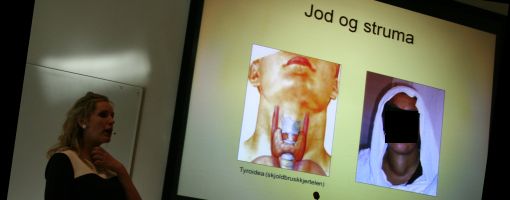
Sigrun Henjum defended today her PhD thesis on the iodine levels in the Saharawi refugee camps in Algeria.
The dissertation for PhD degree, “Excessive iodine intake among refugees from Western Sahara. - A cross-sectional study of long-term refugees located in Algeria” was today successfully defended at the Oslo and Akershus University College.
The data for the thesis was collected during a field work in the Saharawi refugee camps in 2007, where the researcher took samples of the iodine concentration in urine, drinking water and food, as well as carrying out both ultra sound tests of the thyroid and questionnaires. More than 800 women and children from 92 households took part in the survey.
The study showed significant public health problems related to the iodine intake.
"There were sky high levels of iodine in camel milk", Henjum stated during her presentation.
Urine samples of children showed that the median level of iodine was the double of recommended. In women, the median level was 1,5 times the recommended level.
The source of the problem is probably due to iodine in the drinking water and milk - particularly camel milk. The urinary iodine levels correlated with the levels of iodine in the drinking water. In addition, in households with livestock children had an increased thyroid volume. The studies also found that 46 % of the women were anaemic, something that negatively affects the thyroid function.
NY Check new Western Sahara poster!
“Try to Visit Western Sahara”…
The Security Council fails Western Sahara and international law
On 31 October 2025, a new resolution was adopted in the UN Security Council calling on the Saharawis to negotiate a solution that would entail their incorporation into the occupying power, Morocco.
Saharawis Demonstrate Against Trump Proposal
The United States has proposed in a meeting of the UN Security Council on Thursday that the occupied Western Sahara be incorporated into Morocco.
Skretting Turkey misled about sustainability
Dutch-Norwegian fish feed giant admits using conflict fishmeal from occupied Western Sahara. Last month, it removed a fake sustainability claim from its website.



